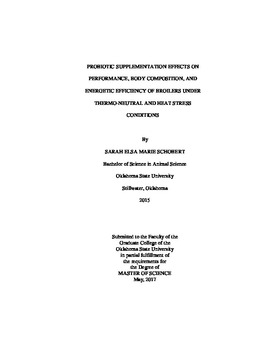| dc.description.abstract | Supplementation effect of 3 Oklahoma State University (OSU) Bacillus strains were examined on broilers' performance, body composition, metabolic parameters, and respiration rate. The experiment was conducted in 2 experimental phases, 0 to 41 d of age and 21 to 41 d of age, fed diets with and without probiotic supplementation, and exposed to thermo-neutral (TN) and cyclic heat stress (HS), respectively. During phase I, a total of 432 d-old Cobb-500 chicks were transported to the study site and randomly divided into 72 floor pens and fed 2 diets, control (no probiotic) and treatment (probiotic) to 6 wk of age. On d 21, phase II of the experiment was initiated with 52 broilers, fed with and without the OSU probiotic. The broilers were randomly selected from the floor pens and transferred to the OSU Poultry Metabolic Chambers. The birds were subjected to 4 treatments, no probiotic at TN (CTN), probiotic at TN (PTN), no probiotic at HS (CHS), and probiotic at HS (PHS). The HS birds were exposed to 32 ± 1°C from 1800 to 2100 h. Phase I probiotic-fed birds showed an increase (P < 0.05) in their BW, body composition, and metabolizable energy retained during the first 2 wk of age. However, mixed results were noted after wk 2. Furthermore, in phase II, PHS showed an improvement (P < 0.05) in their wk 6 BW when compared to CHS. Weekly average respiration per min was lower (P < 0.05) for PHS when compared to CHS, indicating a limit in these birds ability to dissipate heat and maintain homeostasis. Based on obtained results, the fed probiotic improved performance in the early life of broilers. In addition, broilers exposed beyond optimal ambient temperatures found relief when the diet included OSU probiotics. These results suggest continuous probiotic supplementation in a TN environment has no economic merits. Probiotics may give more benefits to broilers when supplemented the first few days during ration changes and in stressful management scenarios, such as HS. Further research is needed to investigate the effect of probiotic supplementation for the first few days of each diet change. | |
